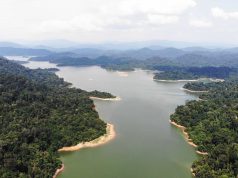

This is vital in order to ensure stronger conservation efforts are applied in the state, said Sabah Head of Conservation Dr Robecca Jumin.
“Our Living Landscape Programme looks at landscaping approach to combine conservation and sustainable development by integrating protection of forests, wildlife and rivers, with RSPO (Roundtable on Sustainable Palm Oil) certified production of oil palm, restoration of ecological corridors and riparian reserves,” she told Bernama here, today.
In Sabah, Jumin said, species such as banteng, pangolins, orang utans, elephants and sun bear all face the threat of extinction if little is done to curb wildlife crimes such as poaching.
She said a large part of WWF-Malaysia Sabah’s work over the years was to help curb the extinction of wildlife in the state with continuous conservation work together with various government agencies.
“Under our anti-poaching work, we assist the law enforcement agencies such as Sabah wildlife Department, Sabah Forestry Department, Sabah Parks and Yayasan Sabah by providing information, capacity training and technology in combating wildlife crime,” she said.
Commenting on the death of Iman, Malaysia’s last Sumatran rhino, Jumin said, WWF-Malaysia was saddened by the loss of a beautiful species in Sabah.
Jumin said it was a sobering reminder that nature was not invincible and a desperate wake up call to protect other wildlife from suffering the same fate.
“Poaching is one of the biggest threats to wildlife in Sabah. Hence, while we must collectively address the threat of poaching, we must also work on saving the natural habitats that harbour our wildlife species,” she added.
Iman was captured in 2014 in the Danum Valley, Lahad Datu and is estimated to be 25 years old.
The death of the female rhinoceros at 5.35 pm on Saturday, marked the extinction of the species (Dicerorhinus sumatrensis) in Malaysia.
— BERNAMA








